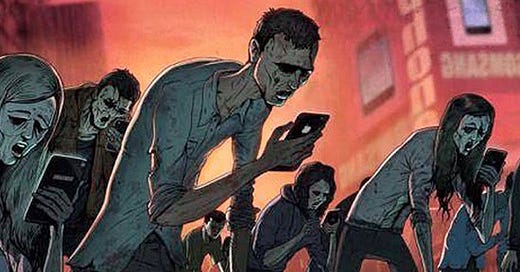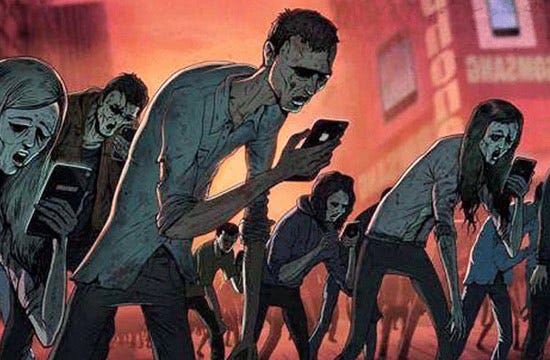Smombie apocalypse: don't be a smombie
It was a Saturday afternoon and I was sitting on the train when a couple of teenage girls hypnotised to their smartphones with music blaring sat in adjacent seats. This trend of listening to music or watching videos on public transport without headphones is a huge pet peeve of mine.
I'd had a couple of drinks that day and they only looked about 16 so I was feeling tough. I got out my phone, fired up YouTube and found the most annoying hard house tune and played at equally annoying volume.
My seated neighbours were riled by this selfish act of equal proportion. 'Oy! we were here first!' one of them shouted. Their logic was bewildering but maybe they're right and this is the new etiquette of the smombie generation.
Smombie meaning
Smartphone zombie or smombie is used to describe people who don't pay attention to their surroundings because they are focused on their smartphone. It's not unusual for smombies to put themselves and others in danger due to their dopamine-induced smartphone addiction.
Smombie behaviour is often seen as thoughtless and self-centred. They respond obediently to every notification, get excited about likes, comments and endlessly scroll Facebook and Instagram.
The game they’re playing is completely pointless but with declining cognition, they can't see the wood for the trees. Smombies are puppets, they are controlled by their puppetmaster the smartphone.
Do smartphones control us?
"We become what we behold. We shape our tools, and thereafter our tools shape us."
John Culkin
Do we control the tool or does the tool control us? Throughout human history tool use has been predominant with the smartphone being one of the most ubiquitous examples.
Tools change how we think, act and use our brains. The malleable nature of our brain means they are physically changed based on how we use them (neuroplasticity). London taxi drivers are often used as an example as their hippocampi are found to be larger due to all the street names they need to memorise as part of "the knowledge". Other examples include those that play instruments, literate vs illiterate, frequent meditators etc.
Technological determinists argue that technology shapes the individual while Instrumentalists take the contrary view and argue that individuals play an active role in using technology. I'm inclined to agree with the determinist view and John Culkin: our tools shape us. In which case you have to ask, what are smartphones doing to our brains?
Smombies are less human
dehumanize
verb (used with object), de·hu·man·ized, de·hu·man·iz·ing
1. to deprive of human qualities or attributes; divest of individuality: Conformity dehumanized him.
Smartphone overuse but more specifically: social media, is dehumanizing. Intel Corporation surveyed 12,000 people across 8 countries and found that 61% of young adults felt technology was dehumanizing.
Smombies are constantly texting, tweeting and updating their status on Facebook while participating less in intrinsic human activities: speaking face-to-face, making eye contact and feeling empathy. All of this despite strong evidence that shows social media use correlates with decreases in mood levels. So not only are you a worse person to be around, but you feel bad for it too.
Being a smombie makes you stupid
Nicholas Carr's book The Shallows is about how the Internet is changing the way we think read and remember. The main argument is: the Internet may diminish the brain's capacity for concentration and contemplation.
One study referenced in the book attempts to learn how the software we use on a daily basis impacts our brain. An experiment carried out by Christof van Nimwegen had 2 groups of volunteers working on a complex game using a computer.
One of the groups used software that was designed to be helpful with visual clues that highlighted permitted moves and various other on-screen assistance. The other group had bare-bones software which offered no support.
In the early stages, the group with helpful software made correct moves more quickly (as expected). But as the test continued the proficiency of the group using the basic software increased more rapidly. In the end, the group using the unhelpful software were able to complete puzzles more quickly and with fewer wrong moves.
I find this study compelling, from experience; my spelling has become awful since spellcheck. The part of my brain responsible for remembering how words are spelt has been diminished. This study only highlights how overdependence on helpful software could have a diminishing effect on cognition.
Social media certainly doesn't fall into the 'helpful software' category it's (mostly) a waste of time. Instead, that time could be used on something enhancing cognition or improving concentration by simply doing nothing. So, while Google maps might weaken your navigation skills, Instagram will make you all-round dumber!
Smombie's are selfish
Smartphone use has been found to make people less socially minded. One study by the University of Maryland found that after a short period of smartphone use subjects were less inclined to volunteer for community service when asked, compared to control-group counterparts.
The past few decades have witnessed a societal shift from a commitment to the collective to a focus on the self. The rise of individualism can't be solely attributed to smartphone use but it must add fuel to the fire. Social media platforms are tools for the ego that peddle constant comparison and self-obsession. In Will Storr's book "Selfie", there's a young woman called CJ with an obsession of posting thousands of selfies. In CJ's words:
‘I’ve genuinely taken selfies at a funeral,’ ... ‘It was my godmother’s. I was in black with red lipstick. We were standing around waiting for the coffin to come in and I was thinking, “This is a look I don’t pull off often.”’
While CJ might be an extreme example, it's hard to argue that social media doesn't create more self-centeredness when most of social media is “all about me.”
Being a smombie is bad for you
"The bombardment of stimuli via the Internet, and the resultant divided attention commonly experienced, presents a range of concerns"
Professor Jerome Sarris, Director of Research at NICM Health Research Institute
It won't come as a surprise that being a smombie is bad for your health. Mental health issues are a real concern. The frequent checking of smartphones, waiting for something to change, is linked to anxiety and depression. The health consequences are compounded by the fact you've become a worse person.
Don’t be/come a shombie
The takeaway from this post isn't that the Internet is bad and you shouldn't use Google Maps while walking down the street. The Internet is an amazing resource, however, a growing part of the population have logged out of reality. These people have crossed the tipping point into shombification. But you still have time, resist your puppetmaster, come back from the abyss; listen to a podcast, read a book, disable notifications, enable greyscale, buy a dumbphone, delete Instagram/Facebook/Twitter. Start being human again. Finally, I'll leave you with a quote from The Shallows.
"For millenia, tools have helped us live our lives more fully, and it is wise to pick up and master the new ones that are developed. But it is up to us to continue to use tools consciously and carefully, in order that they may allow us to be more, and not less, alive."
Nicholas Carr









